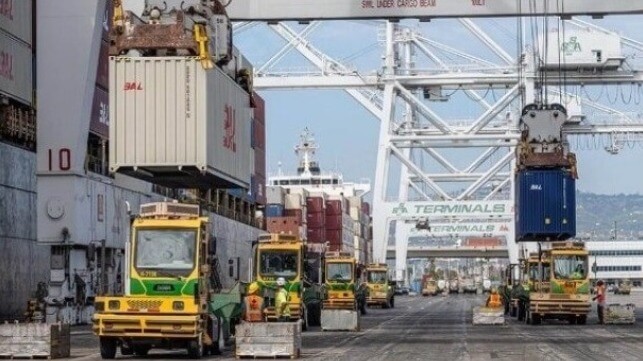ILWU Reports Tentative Agreement on Some Contract Negotiation Issues

The International Longshore and Warehouse Union (ILWU) announced today that it has reached a tentative agreement with the Pacific Maritime Association (PMA) on what it terms “certain key issues” in the long-running contract negotiations covering the 29 U.S. West Coast ports. The announcement from the union headquarters came following a month of contentious relations between the PMA and the union’s local for the ports of Los Angeles and Long Beach and growing calls from the port community and shippers for a resolution of the longshore workers’ contract.
The negotiations began in May 2022 for the contract which expired on July 1 and covers approximately 22,000 employees. Both sides said they would refrain from commenting during the negotiations but twice before issued updates. The union and the employer said in July 2022 that they had reached a tentative agreement on terms for the maintenance of health benefits and followed that seven months later saying that they were making progress and “remain hopeful of reaching a deal soon.”
In its statement, the ILWU said today that “the talks are continuing on an ongoing basis until an agreement is reached.” They reiterated that the PMA and ILWU have agreed not to discuss the terms of the tentative agreements as negotiations continue.
In recent weeks trade associations ranging from the agricultural sector to retailers have all reiterated the concerns saying that the uncertainty was bad for their operations and the U.S. economy. Speaking earlier in the month, Gene Seroka, Executive Director of the Port of Los Angeles said “all eyes” are on the contract negotiations and the time has come to get a settlement.
The West Coast ports continue to say the contract talks are a key contributor to their decline in volumes. Yesterday, the Port of Long Beach reported that its overall volume was down 30 percent in March citing continue high retail inventory levels and as “shippers shuffle routes from the West Coast to seaports on the East and Gulf coasts.”
Statements in recent weeks from both the PMA and Local 13 of the ILWU which covers the ports of Los Angeles and Long Beach have further contributed to the concerns. Tensions began to rise in mid-March when the union members stopped staggering their meal breaks during their shifts at the Southern California ports. The PMA said it was a provision in the old contract and that by failing to abide by it the longshore workers were “creating significant delays.” Because a new contract was not in place, the PMA said there was no option to arbitrate the matter and require the union to man the terminals continuously without interruption.
Union members failed to report for their assigned shift on the evening of April 6 and again for the morning shift on April 7 with the local saying it was due to a monthly union meeting followed by the Good Friday religious holiday. While workers return to the assigned shifts, the PMA since then has said the local is using new tactics the employer association called illegal to continue to disrupt activities at the ports of Los Angeles and Long Beach.
“As has been pointed out for years, any actions that undermine confidence in West Coast ports threaten to further accelerate the diversion of discretionary cargo to Atlantic and Gulf Coast ports,” wrote the PMA in its latest statement. They accused the local of placing quality jobs at risk far beyond the docks.

that matters most
Get the latest maritime news delivered to your inbox daily.
ILWU Local 13 responded yesterday saying that its members operate, maintain, and repair cargo handling equipment at the marine terminals within the Ports of Los Angeles and Long Beach and part of their responsibility is to inspect the equipment. They are contending that some of the terminals overlooked equipment maintenance during the surge in container volumes over the past two years.
Local 13 said that it is using the current lull in cargo volumes to conduct these mandatory equipment inspections. Citing the dangers of potentially poorly maintained equipment, they said union members expect to complete these inspections in a systematic and expeditious manner. Reports from the ports have said equipment is being red flagged as dangerous during these inspections resulting in equipment shortages and further delays in cargo handling.
